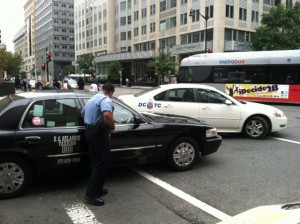
A DCTC hack inspector uses his vehicle to block in a cab (a move of questionable legality), and an MPD officer (front) then arrives to assist the inspector.
The Taxi Link airs on WUST 1120 AM. Listen to Sept. 15 show here:
Audio clip: Adobe Flash Player (version 9 or above) is required to play this audio clip. Download the latest version here. You also need to have JavaScript enabled in your browser.
“You have one media person interviewing another media person who shares the same biased opinion.” – Tony Norman, co-host of The Taxi Link
“I think if you had the policymakers in the room right now what they would say is…” Thus began Washington Post reporter Mike DeBonis’ response to a caller last week on WAMU’s The Kojo Nnamdi Show, guest-hosted by Rebecca Roberts. It is unclear what policymakers would have added to DeBonis’ and Roberts’ one-sided discussion of D.C.’s taxi industry. “Hailing a taxi and paying for the ride should get a little easier thanks to the biggest overhaul of the D.C. taxi system in decades,” Roberts said in her introduction. But, alas, the “technological and ecological improvements” have been held up in court, said Roberts.
Judge Monica Parchment of the Contract Appeals Board has indeed suspended the city’s controversial 5-year, $35 million contract with VeriFone to install so-called taxi smart meters in all 6,500 District cabs. Despite cabbies’ pleas and protests, the VeriFone deal was pushed through using emergency legislation. Serious questions about the now-suspended contract remain unasked and unanswered in the media. “Unfortunately for cab riders, [the Board’s decision] means it’s going to be at least a couple months and perhaps a lot longer before we start seeing these devices in most and eventually all D.C. cabs,” said DeBonis.
WAMU’s taxi discussion became less one-sided when they opened up the phone lines. “I don’t here you all talking about the privacy issue,” said James, a cab driver, who raised concerns about the smart meters’ ability to track both drivers and passengers. After dismissively stating that GPS tracking had “stirred up” drivers, DeBonis said there wasn’t much to worry about because “that’s something that the D.C. Taxicab Commission has addressed, that the D.C. Council has addressed.” DeBonis continued, “From the city’s perspective, they want to see where the cabs are. Are they clustering in one particular part of the city? What is the supply of cabs that are in the outlying parts of the [city]?”
“They already know that they’re not servicing… Wards 7 and 8. You don’t need to install a monopolistic smart [meter] system to tell you that most of the cabs are downtown and at the airports,” said D.C. Advisory Neighborhood Commission member Tony Norman. Along with TheFightBack‘s Pete Tucker, Norman co-hosts The Taxi Link, which airs on WUST 1120 AM and is sponsored by The Small Business Association of DC Taxicab Drivers, the largest D.C. cabbie organization by far. “That’s not a justification for putting in one company, one meter, just so that they can learn this information. That’s absurd. It shows you that this is a media that has adopted the press releases put out by [taxi chair Ron] Linton and the mayor’s office, and [is] not doing independent research,” said Norman, who’s chairman of the board of Pacifica Radio’s WPFW 89.3 FM.
Also discussed on The Taxi Link was the upcoming Sept. 19 hearing of the D.C. Taxicab Commission where the Commission is scheduled to discuss whether and how to regulate luxury sedan companies like Uber. On the agenda for Wednesday’s meeting is also “the adoption of emergency regulations to implement the $0.50 passenger per trip surcharge.” The Commission is trying to move forward with the surcharge despite the fact that the main justification for implementing it was the now-suspended VeriFone contract. The Commission is also scheduled to take up amendments to the regulatory code that governs the industry in an attempt to make permanent what was passed into law on an emergency basis.
“We need to be there,” said Mekonnen Abel Seyoum, an organizer and D.C. cab driver. “[We need to] show them we are united, show them we are concerned about the issue, and tell them what to do.”
Related stories:
Taxi Chair and Media Make Serious Allegations Against Drivers, But Offer No Evidence, April 5, 2012
VeriFone contract suspended, Sept. 3, 2012
Is classism behind D.C.’s push to regulate taxis, not Uber? Sept. 9, 2012
